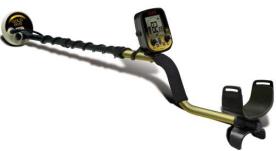At first glance, metal detecting seems like the least demanding form of prospecting for gold. But it has its share of challenges, too, just like sluicing, drywashing, or panning by hand. Whether you've been swinging a metal detector for years, or just purchased your first machine, there might be a few things you could do to increase your chances of uncovering a piece of buried gold. 
• Properly tune your detector. Whether it's a $200 or a $5,000 model, the settings are important to get right -- especially Ground Balancing and Gain/Sensitivity. Goldfields are usually heavily mineralized, which can make it really frustrating to know a false target from a real one, so follow the manufacturer's directions for ground balancing and do it often. Ideally, the Gain/Sensitivity is run as high as possible while maintaining a stable threshold as you swing. Try pumping your coil up and down during ground balancing.
• Control the Coil. The coil should be kept level and close to the ground from one end of your swing to the other. If your swing arcs and the coil is coming off the ground several inches on the ends, you may get false signals and lose a lot of depth. Also, don't swing too slowly. A Pulse Induction (PI) detector performs better with a slower swing, but a Very Low Frequency (VLF) machine needs to be swung faster to detect targets.
• Target Recovery. If you have ever "lost" a target after you first heard it, try this: after pinpointing, start digging until you have moved a small pile of dirt. Pass the material from your pile, one scoop or handful at a time, over the TOP of the coil. You will have better target recovery if you move the target first.
Gold detectors are not necessarily higher in cost, but they are built with a higher sensitivity to detecting gold nuggets, have better ground balancing and discrimination abilities. Reading your owners' manual cannot be stressed enough. Once you know how to use your detector, then practice makes perfect. Sometimes success comes after just making a few small adjustments and getting out in the field as often as you can. If you're shopping for a gold detector, click here for ideas. Good luck and have fun!
Nugget of News Blog






